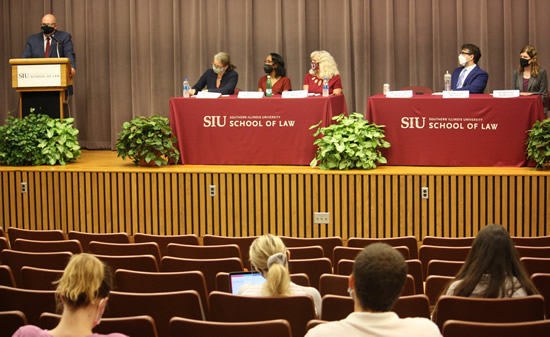A SIULAW faculty discussion on recent and pending constitutional decisions before the US Supreme Court is featured in this article in the student-run news organization for SIUC, The Daily Egyptian
October 04, 2021 ,

On Sept. 17 five law professors at Southern Illinois University at Carbondale (SIU-C) convened in a panel to discuss their opinions on recent constitutional arguments on topics including reproductive rights and the extent of Fourth Amendment protections.
The panel was scheduled in honor of Constitution Day, the anniversary of the signing of the Constitution in 1787, and was broadcast for public view on the SIU-C Chancellor’s YouTube channel. Members of the panel were chosen by the students of five different law classes that also chose five cases pertaining to current social issues, including those being ruled on by the Supreme Court in its coming session, which begins Oct. 4..
Camille Davidson, dean of the SIU-C school of law, presented the case of Dobbs v. Jackson Women’s Health.
Davidson said the case was first filed in 2018 in Mississippi immediately following the passage of the state’s Gestational Age Act, which outlawed abortions after 15 weeks of pregnancy with no exceptions for rape or incest.
“This fall, the court will consider whether all pre-viability prohibitions on elective abortion are unconstitutional,” Davidson said. “This is the first time the court will rule on pre-viability since Roe [v. Wade].”
Viability in this case refers to the point of gestation in which a fetus has the ability to live outside of its mother.
Davidson said the Mississippi case comes at the same time as the recent bill from Texas which ruled all who receive abortions in the state after the development of fetal cardiac activity, occurring at approximately six weeks, and all who aid or abet in the act, are liable in private courts for $10,000 and attorney’s fees. She said both the Gestational Age Act and the Texas bill are seen as challenges to the Supreme Court’s decision in Roe v. Wade.
“This will affect people who do not have the means to travel to the jurisdictions where this procedure is available,” Davidson said. “Of course this overwhelmingly affects poor people and people of color.”
Davidson said the question of viability is one that clouds the conversation surrounding abortion. She said general consensus around the age of viability at the time of Roe was approximately 28 weeks and has since been reduced to 20 weeks.
“I think when we start to look at what things might look like in the future, I think we may scale back on the hard lines,” Davidson said. “I think we’ll see some restrictions that may mirror what some polls suggest, they say 75% of the population believe in some form of reproductive access to abortion.”
Davidson said the difficult part will come from the state-to-state implementation of such a right. She said Mississippi already has some of the most restrictive abortion laws in the country, requiring at least two in-person clinic visits and a minimum 24 hour waiting period on procedures, as well as state mandated bias counseling before the procedure can be performed.
“So the pre-viability regulations can pass constitutional muster, if they don’t pose an undue burden, which of course requires the weighing of the state interest to the woman’s elective right,” Davidson said. “But if it is a ban, previability bans are unconstitutional, regardless of the state’s interest.”
Read the complete story here.


